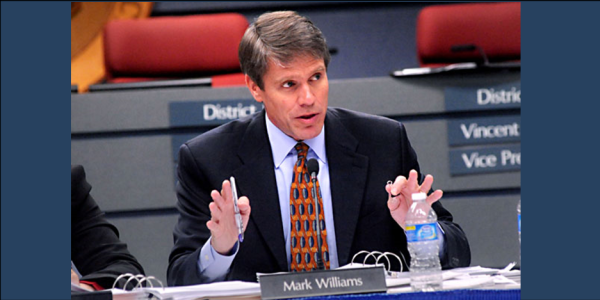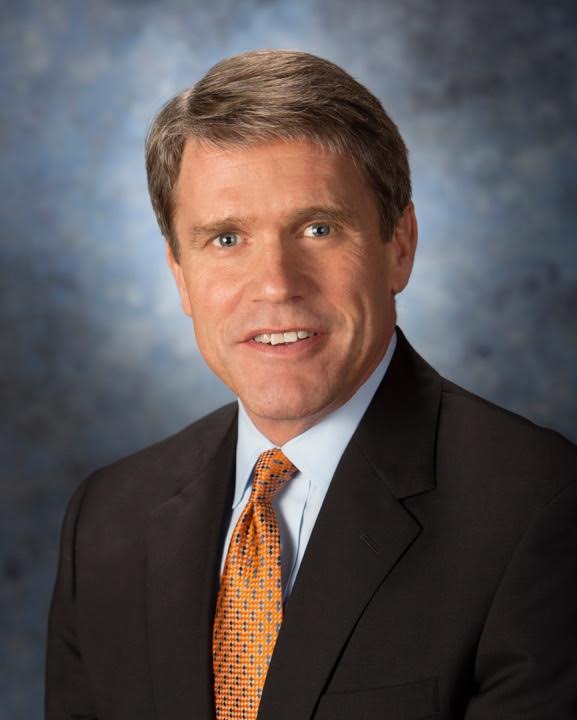
By: Elizabeth McGuire
Mark Williams is the type of busy person who somehow still makes you feel like he has all the time in the world for you. Case in point: when our schedules didn’t allow for a face-to-face interview, he genially promised a phone call from his next destination: Africa.
It’s this sort of non-stop dedication that has benefited dozens of organizations in Austin and beyond. Williams is currently serving on 15 different non-profit and civic boards, and has devoted countless hours to community service throughout Central Texas.
Williams is an alumnus of the 2004 Leadership Austin Essential class and this year’s recipient of the Polly Scallorn Community Trustee Award. The award honors Essential alumni who exemplify the principles of community, inclusion, collaborative decision-making and personal responsibility over a lifetime of achievement.
Originally from Dallas, Williams graduated from the University of Texas in 1981 with a BBA in Accounting. He spent 12 years with Arthur Andersen before moving to Dell, where he continued working in finance, management reporting and internal audit positions. Since leaving Dell in 2000, Williams has become a constant and generous community leader, primarily focusing his time and expertise on Austin organizations that support education, health and human services.
In November 2014 Williams was elected to the Austin Community College District Board of Trustees and is still serving in that role. He served on the Austin ISD Board of Trustees from 2004-2012, including as Board President from 2006-2012.
 His colleagues have praised him for his devotion and his thoughtfulness. Former AISD Board Chief of Staff and General Counsel Mel Waxler, who is now Executive Vice President and General Counsel for Blinn College, describes Williams as a “consummate public servant.”
His colleagues have praised him for his devotion and his thoughtfulness. Former AISD Board Chief of Staff and General Counsel Mel Waxler, who is now Executive Vice President and General Counsel for Blinn College, describes Williams as a “consummate public servant.”
“In his service to the students, faculty and community of AISD, he is among the top leaders who cared deeply, who sought positive outcomes that were sustainable, and asked probing questions to ensure that his votes reflected informed, data-driven decisions,” said Waxler. “I was honored to serve him and to work with him.”
Williams currently serves on the board and in various officer or committee roles with numerous organizations including the Ann Richards School Foundation, Austin Partners in Education (APIE), Austin Education Fund, Capital Area Food Bank, Communities in Schools, Friends of Garza High School, Friends of the Zilker Kite Festival, KDK-Harman Foundation, Legacy of Giving Community Advisory Board, Longhorn Village, Tomorrow’s Child Legacy Foundation, Trail of Lights Foundation, UT-Austin DDCE Advisory Council, United Ways of Texas (current chair) and University High School.
The list of past organizations Williams has supported or chaired is just as impressive. Longtime friend and fellow community leader Bobby Jenkins called him an “amazing asset and treasure to Central Texas.”
“Mark is a consensus builder. He listens to people. He understands different viewpoints. And what he has given back to the community…it is simply unprecedented.”
Leadership Austin is thrilled to honor him at the upcoming Best Party Ever on May 6.
What’s the most rewarding part of your work?
If I play to my strengths, I feel like I can add value to a wide variety of organizations and nonprofits. I’m a business person by trade, but I understand the role of governance, non-profits and relationships, and I can speak the language of these organizations.
Because of the space I run in, I have access to philanthropists and donors. I can connect people with resources and that’s very fulfilling. It’s even better if I can get people to give because they develop an interest, not just because I asked. If I can move them from relationship-driven giving to cause-driven, then they are motivated by something different and more invested.
As far as working, I don’t do the same thing daily, which I really enjoy. I’m a project person. What I do now fits what I like to do. In one day I might meet with five different organizations. It energizes me. For others that might be overwhelming, but I can’t do the same thing eight hours a day.
What are the advantages of working with such a large number of non-profit boards?
It allows me to do better. I see connections, and I recognize that I’m able to see things that others can’t. I know enough–I’m analytical and see patterns–but I also have an approach where I can help others navigate the non-profit or public sectors.
I was fortunate enough at Dell to be able to move into a place where I don’t have to work. And now maybe I can’t write big checks, but I can give my time. I’ve been incredibly lucky and blessed. I love it. It fits me. I found roles that play to my strengths.
I may not always agree with people, but I always try to be respectful and open and not alienate people. My goal has always been to help make Austin a better or stronger place, and I’ve found I can do that through the organizations I support.
Any advice for Austin leaders?
Figure out how much time you have and where you want to spend it. The value of the opportunity needs to come from both sides. Find areas of interest. I say “interest” instead of “passion,” because honestly my passions are things like my family. But I have a lot of interest in education. So I suggest figuring out your set of skills and how much time you can give. Find things you do well. It may not always be what people need, but I would say play to your strengths and don’t get involved in an organization or cause that doesn’t truly interest you.
Does listening come naturally to you or was it a learned skill?
Both. I took a career path that required listening skills. I spent 12 years as a public accountant with several clients in one day. I learned to accommodate many different personalities.
To be effective you have to adapt to clients and be a little bit of a chameleon. Sometimes that means adapting to different personalities and sometimes it’s the pace of the work or the style of the organization. Many nonprofits operate at a slower speed than businesses so you have to adjust expectations.
How has Leadership Austin influenced the way you work and serve the community?
I love how the organization has expanded over the years, but at its core it’s still just a very cool, very effective organization. Once I got into Leadership Austin and formed a bond with classmates, a lot of things opened my eyes…for example new perspectives and conversations about race.
Leadership Austin helped me understand the value of being a community servant. When I was on the school board and also looking to expand my reach, Leadership Austin enabled connectivity, which helped me build a network and relationships. It helps with connections that we can’t even foresee needing.
I still feel a part of the Leadership Austin family. The program gives you a special relationship with other alumni. We all share this similar experience. We speak the same language. We have the same baseline experience, even if we never even talk about Leadership Austin. It’s more like a tone and a way of communicating and listening.
Thoughts on receiving the Community Trustee award?
It’s an incredible honor. It’s a culmination of what Leadership Austin is about: taking a raw product (me), then launching it into the community to make an impact. I would give credit to Leadership Austin more than me.
I’m humbled that others think I’m making a difference in the community. I feel darn lucky.

